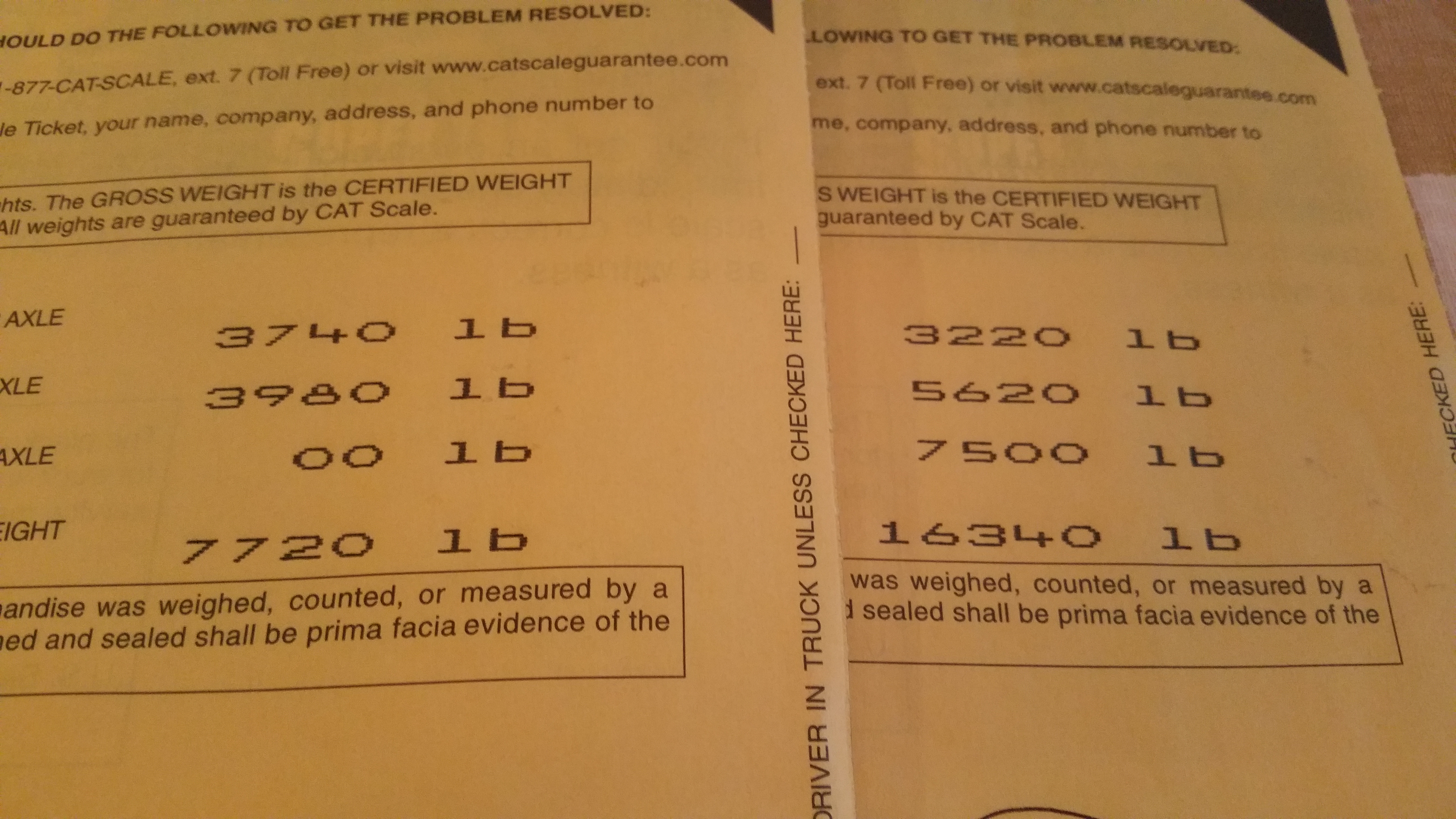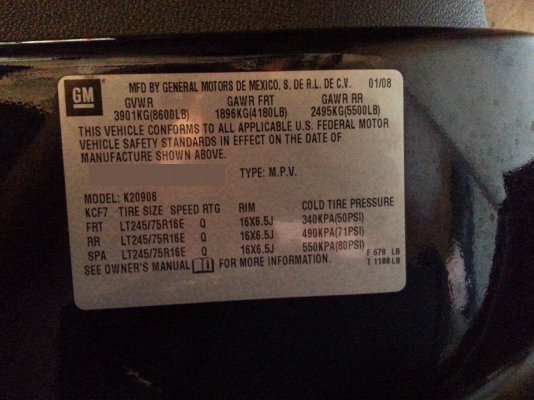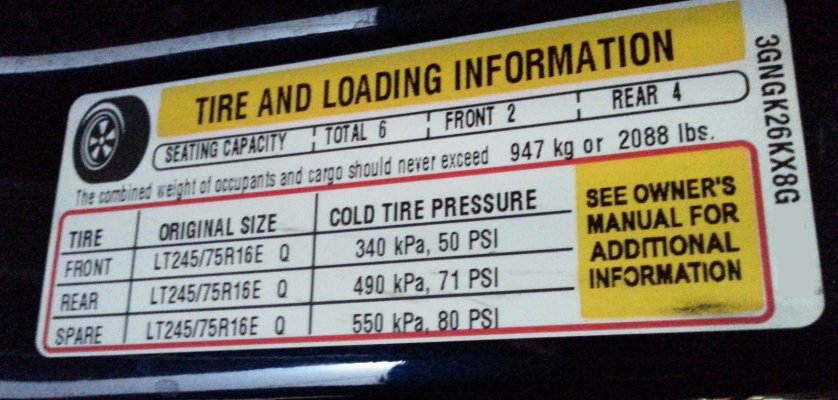Ok, so let's put on a little clinic. I'm feeling verbose today. Commence drinking from fire hose.....
Here are the numbers we need to know:
Weigh slip, no trailer on the left, with trailer on the right. Family and gear loaded into the truck:
Sticker inside driver's door:
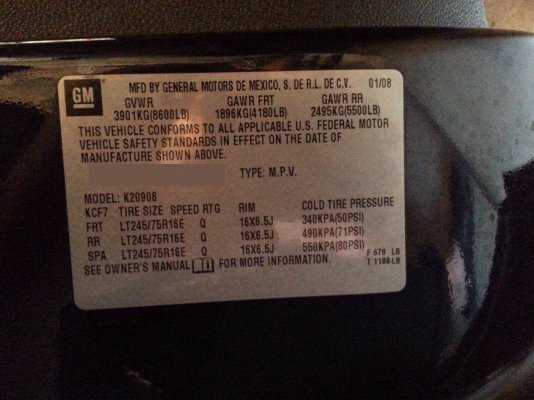
The numbers on the weigh slips:
.........................No trailer....With trailer
Steer axle..............3740..........3220
Drive Axle..............3980..........5620
Trailer Axle...............0.............7500
Gross weight..........7720.........16340
And the numbers on the sticker:
Gross vehicle weight rating (GVWR) 8600
Gross Axle Weight rating front (GAWR FRT) 4180
Gross Axle Weight rating rear(GAWR RR) 5500
And from my owner's manual (2013 manual, page 9-67)
Gross Combined Weight Rating (GCWR) 16000
That's a lot of numbers. What do we do with this information?
Notice I make no mention, until now, of the "trailer tow rating." Honestly, by itself, it's a meaningless number. It's a marketing tool to make the truck sound more badass. I'll explain a little later.
Axle ratings should be self-explantory. Maximum weight each axle can/should carry.
GVWR is the total weight on the two vehicle axles, in other words, the sum of the two axle weights.
GCWR is the weight of your entire rig - the sum of front, rear and trailer axle weights.
Looking at each of my ratings and comparing to the actual weights:
1) Front axle - max load is 4180, I'm not higher than 3740. I'm good. Notice also that with the trailer attached, I have 500 lbs LESS on the front axle. I wasn't using a weight-distributing hitch here.
2) Rear axle - max load is 5500. With the trailer attached, I'm at 5620. I'm over. In this instance I wasn't using weight distribution, so WD would help push weight from the rear to the front axle. Also, this is the number you should pay particular attention to if you own a half-ton (1500) SUV. This is the one most likely to be exceeded first.
3) Trailer axle - 7500 lbs. Ok. We'll use this number in a minute.
4) GVWR - my rating is 8600. As I mentioned, GVW is the sum of front and rear axles. 3220+5620=8840. I'm over. I guess we have to leave some people or gear behind. ;-)
5) GCWR - my rating is 16,000, and I'm at 16,340. Again, I'm over. Remove some stuff.
Now, we can find out some other numbers that are handy.
Tongue weight - this is important because the tongue weight is the amount of weight the trailer puts on the wheels of the tow vehicle. Subtract this number from your payload, and that's how much weight is left for your hitch, people and gear.
Here's what your payload sticker looks like:
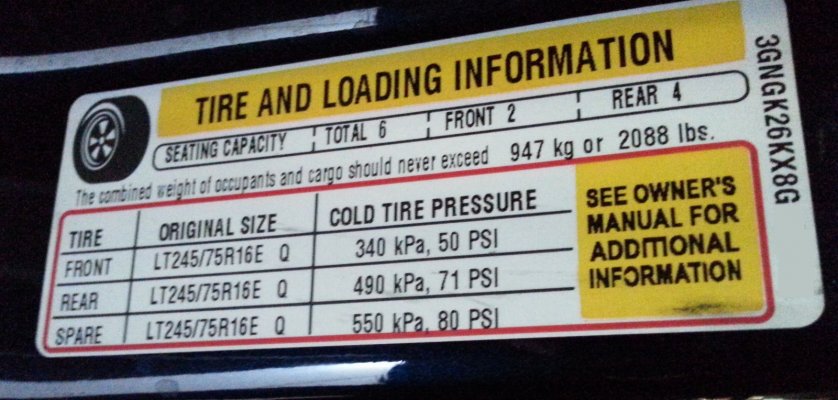
In my case, my payload is 2088 lbs. To calculate the tongue weight of the trailer, I subract the sum of my vehicle axles with the trailer (my GVW) from the sum of the axles without the trailer:
(5620+3220)-(3740+3980)=1,120
The trailer tongue weight is 1,120, and looking at the sticker on my hitch, my max tongue weight is 1,000, using weight distribution. So again, I'm over.
That also means my remaining payload is 2088-1120=968 lbs for people and gear. People and gear in this case weigh more than 968, because I'm over on my GVW. I know that's true because my family of 5, with my fat butt and two teenage boys both 200 lbs, weighs almost 1000 lbs, and then we also had a bunch of gear in the back, plus the weight of the hitch in the receiver.
I can also figure out the total weight of the trailer (hint: it's not 7500 lbs), by subtracting the two totals:
16340-7720=8620
Trailer weighs 8,620 lbs. This checks, because my trailer tires have 7500 lbs on them, and I already know my tongue weight is 1120, so 7500+1120=8620.
Now, if I look in my owner's manual, it says my truck can tow a trailer up to 9,400 lbs. So this is only an 8600-lb trailer, and I'm over on most of my ratings. What gives? This is why it's a meaningless number. Sure, I might be able to tow a 9400-lb trailer if it was just me in the truck, no family, and no extra gear. And maybe if I lost some weight. No one ever pulls their trailer solo, so that's why I say this is a worthless number.
Now, I'm over on a lot of my weights, but I know my vehicle, and the 3/4-ton trucks can take a lot more abuse than the half-tons. For example, the rear axle in my truck is the American Axle 10.5" freefloater. AA rates this axle to a max of 8600 lbs. So why does my sticker say 5500? The TIRES are the limiting factor. The E-load tires on my truck are rated to 3,000 lbs max load, and I guess GM wants a safety margin, so they lower it to 5500. So I'm not worried about the 5620 number, because I'm not overloading the weakest link - the tires. 2x3000=6000 lbs max load on the rear tires.
However, on a half-ton, those trucks have a much weaker semi-floater axle, and don't like it much when they're overloaded. Ask me how I know. My 2001 Suburban has gone through THREE rear axles, and I had it break several times while on a vacation road trip.
The bottom line to using all of this information is to make sure you stay within the limits of your vehicle's cababilities, and that you keep your family safe, and the others on the road, and that you don't break anything on your vehicle. It's a lot more than, "How much trailer can I pull?"
Any questions?

